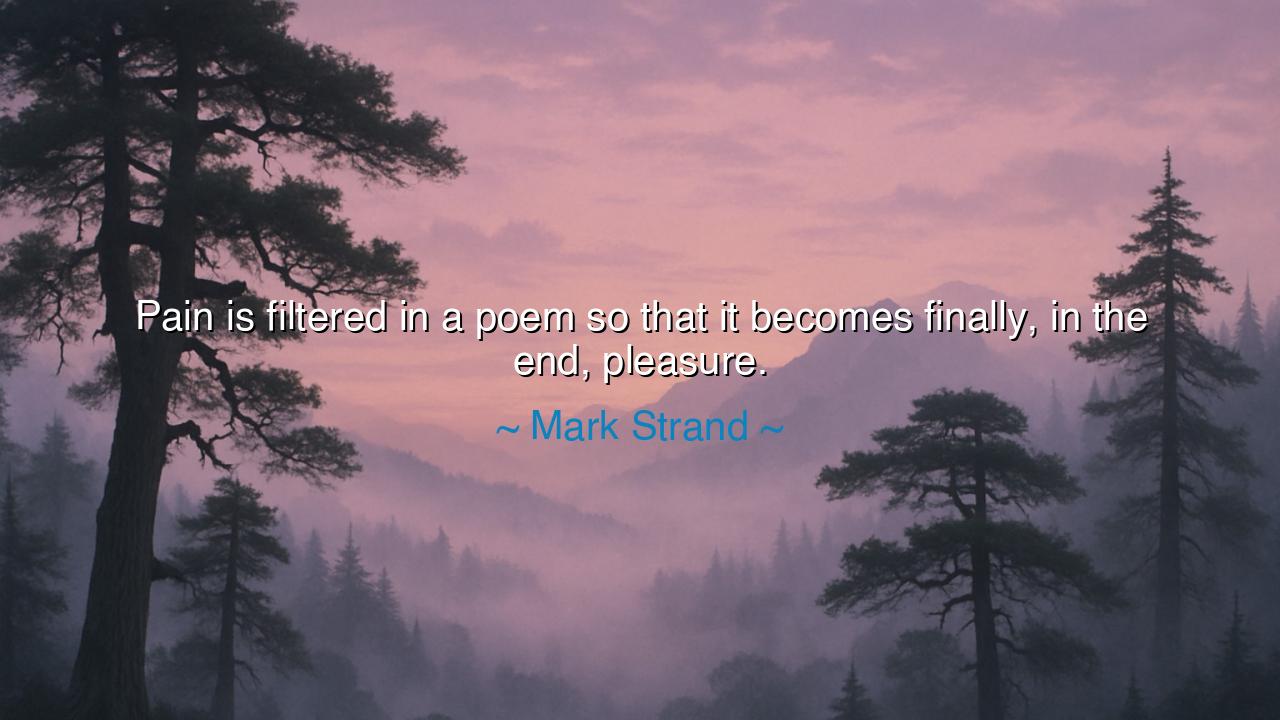
Pain is filtered in a poem so that it becomes finally, in the






Hear the voice of Mark Strand, poet of shadows and light, who revealed a secret of art and of life itself: “Pain is filtered in a poem so that it becomes finally, in the end, pleasure.” In these words, he shows us that the work of poetry is not to deny suffering, nor to escape it, but to transform it. The poet takes sorrow, grief, and despair, and passes them through the sieve of language, rhythm, and image, until what once burned and wounded is reshaped into something beautiful, something that gives comfort to others, even joy. Thus, art redeems anguish, and pain itself becomes the seed of pleasure.
The meaning is profound. When a person suffers, the pain seems raw, unendurable, without form. Yet when the poet names it, gives it shape, arranges it into verse, the chaos becomes order. What was formless agony becomes pattern, cadence, song. This act of shaping does not erase suffering, but it gives it meaning, and in that meaning lies relief. The reader, too, is touched: in the poet’s sorrow he finds his own, but through the beauty of words he feels uplifted, even consoled. Thus, poetry is the alchemy by which pain is transmuted into something more than itself.
The ancients knew this truth. The tragedies of Sophocles and Euripides did not avoid grief—they embraced it. On the stage, the Athenians watched kings brought low, children slain, and gods indifferent to human cries. Yet the audience, weeping, felt also a strange release, what Aristotle called catharsis. This was Strand’s meaning: that through the shaping of grief in art, pain is not only endured but transformed into a cleansing pleasure, a deeper understanding of life. The wound remains, but in its expression, it heals.
History also offers us the example of the war poets of the twentieth century. Wilfred Owen, scarred by the trenches of World War I, poured his agony into verse. His poems did not hide horror; they revealed it in stark, merciless detail. And yet, those who read them today do not merely feel despair. They feel awe at the beauty of his language, gratitude for his honesty, and the strange pleasure of knowing that even in ruin, truth and beauty endure. His pain, filtered through poetry, has become a gift that still speaks across generations.
There is also in Strand’s words a lesson for every soul, not only the poet. For life will bring pain—none escape it. But we, too, may learn to filter our pain into something fruitful. Perhaps through writing, perhaps through art, or perhaps simply through reflection and compassion toward others. When we shape our suffering into meaning, when we use it to deepen our empathy, when we share it so others know they are not alone, then our pain becomes more than mere torment—it becomes service, it becomes wisdom, it becomes pleasure in its highest sense.
The lesson, then, is this: do not waste your pain. Do not hide it in silence nor let it consume you. Instead, find the form that can carry it—poem, song, story, or even the simple act of speaking honestly to another. By filtering it, by giving it shape, you will not erase it, but you will transform it. Others who receive your words will find solace, and you will find that in creating beauty out of anguish, your spirit is lifted. This is the great task Strand describes, one that belongs to us all.
Therefore, remember: pain, when left raw, wounds endlessly. But pain filtered through poetry—or through any act of meaning—becomes not only bearable but a source of light. Let your struggles, your losses, your broken moments become the soil from which beauty grows. In the end, as Strand teaches, what once brought only grief can yield joy, and what once was darkness can shine forth as radiance for others to see.






PT38. Nguyen Thi Phuong Tram
Strand’s quote raises the question: Does the ‘pleasure’ in a poem come from the relief of the pain, or is it the artful way the poet expresses that pain? Does the emotional depth of the poem make the pain easier to accept, or does it allow us to experience it from a safer distance? How do we reconcile the intense emotion of pain with the calming effect that poetry often has on us?
HGDang Ich Hoang Gia
This idea of pain being transformed into pleasure through poetry feels almost therapeutic. It makes me reflect on how people often turn to art to heal. But can poetry really make pain feel like pleasure? Or is it more about providing a sense of understanding and catharsis, rather than an actual shift in how we feel? Could the power of words be enough to change our perception of something painful?
HPHan Phuong
Strand’s view of pain in poetry as a vehicle for pleasure is intriguing. But how does the poet balance the authenticity of pain with the potential for pleasure? Can pain truly be ‘filtered’ in such a way, or does some of its rawness inevitably remain? It’s interesting to think about whether the process of creating poetry helps the poet themselves find this ‘pleasure’ in their own experience of pain.
BBaCoN
Mark Strand’s quote suggests a fascinating transformation of pain through poetry. It makes me wonder, though, how much of that ‘pleasure’ is subjective. Does every reader find pleasure in the pain expressed in a poem, or is this transformation only true for certain individuals? How does a poet make that transition from pain to pleasure? Is it through the beauty of the language, the resolution, or something else entirely?